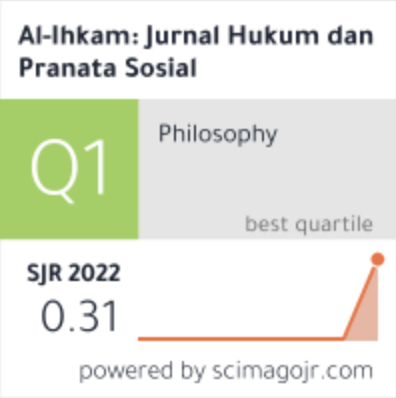Islamic Banking in Global Economic Context (Critical Studies of Operational System and Performance of Islamic Banking)
 Abstract views: 423
,
Abstract views: 423
,
 PDF downloads: 287
PDF downloads: 287
Abstract
Berdasarkan kajian terhadap sejarah kemunculan dan sistem operasional Bank Islam beserta kinerjanya, penulis menyimpulkan bahwa konsep bank Islam pada hakekatnya merupakan bentuk islamisasi terhadap institusi perbankan. Hanya saja proses islamisasi yang terjadi baru sebatas pada aspek-aspek yang bersifat marginal, artifisial, dan formal-institusional, seperti penggantian istilah-istilah teknis dalam dunia perbankan dengan istilah yang berasal dari fikih muamalah, penghapusan bunga, dan penolakan terhadap praktek-praktek bisnis yang haram. Selebihnya, bank Islam tidak berbeda dengan bank konvensional. Dampak dari islamisasi yang kurang substansial-komprehensif tersebut adalah timbulnya kesan bahwa bank Islam justru ‘terbelenggu’ oleh konsep-konsep fikih klasik yang mendasarinya, di mana ia cenderung kontra produktif dengan tren bisnis moderen yang senantiasa menuntut efisiensi dan fleksibilitas. Agar tetap dapat survive di masa-masa mendatang, bank Islam perlu mengevaluasi diri secara terus menerus dengan selalu membuka diri terhadap berbagai kritikan yang dialamatkan kepadanya. Konsepsi yang terlalu berorientasi kepada doktrin harus diimbangi dengan kesadaran akan fakta-fakta dan tuntutan bisnis moderen, baik yang berskala lokal maupun global. Sementara itu cita-cita Islam yang ideal, seperti pemberantasan kemiskinan, pendistribusian kekayaan secara adil, dan penciptaan lapangan kerja, harus tetap menjadi orientasi utamanya.
Kata Kunci:
Riba, Profit and Loss Sharing, Mudlârabah, Murâbahah, Artificial Aspects of Islam
Abstract:
Based on the study of the history of emergence and operation of Islamic Bank and its system performance, the author conclude that the concept of Islamic bank is essentially a form of Islamization of the banking institutions. Such Islamization are limited to the marginal, artificial, and formal-institutional aspects, such as the replacement of technical terms in the banking world with a term derived from the fiqh al-mu’âmalah, the abolition of interest, and the rejection of unlawful business practices. Moreover, the Islamic bank is no different from conventional banks. The impact of such less substantial and comprehensive islamization is the perception that Islamic bank is precisely 'shackled' by the concepts underlying classical fiqh, where it tends to be counter-productive with modern business trends which are constantly demanding efficiency and flexibility. In order to remain able to survive in the future, Islamic banks need to evaluate itself continuously by always open to criticism addressed to them. The conception of Islamic banking oriented too much to the doctrine must be balanced with an awareness of the facts and the demands of modern business, both local and global scale. While the ideals of the Islamic ideal, such as the eradication of poverty, equitable distribution of wealth and job creation, should remain the main orientation.
Downloads
References
Antonio, Muhammad Syafi’i. Bank Syariah: Dari Teori ke Praktek. Jakarta: Gema Insani Press, 2001.
Arifin, Zainul. Memahamai Bank Syariah: Lingkup, Peluang, Tantangan, dan Prospek. Jakarta: Alvabet, 1999.
Baldwin and Wilson, David and Rodney. “Islamic Finance in Principle and Practice (With Special Reference to Turkey)”, in Chibli Mallat (Ed.), Islamic Law and Finance (London-Dordrecht-Boston: Graham and Trotman, 1988), p. 171-189.
Kuran, Timur. “The Economic System in Contemporary Islamic Thought: Interpretation and Assessment”, International Journal of Middle East Studies 18 (1986), p. 135-164.
Mallat, Chibli. “Commercial Law in the Middle East: Between Classical Transaction and Modern Business”, The American Journal of Comparative Law, 48, 1 (2000), p. 81-141.
Naqvi, Syed Nawab Haider. Islam, Economics, and Society. London and New York: Kegan Paul Internasional, 1994.
Niazi, Liaquat Ali Khan. Islamic Law of Contract. Lahore: Research Cell Dyal Sing Trust Library, 1990.
Nienhaus, Volker. “The Performance of Islamic Banks: Trends and Cases”, Chibli Mallat (Ed.), Islamic Law and Finance (London-Dordrecht-Boston: Graham and Trotman, 1988), p. 129-170.
Perwatataatmadja and Antonio, Karnaen A. and Muhammad Syafi’i. Apa dan Bagaimana Bank Islam. Yogyakarta: Dana Bhakti Wakaf, 1993.
Rahman, Fazlur. “Islam: Challenges and Opportunities”, Alford T. Welch and Pierre Cachia (Ed.), Islam: Past Influence and Recent Challenge (Edinburgh: Edinburgh University Press, 1979), p. 315-330.
--------. “Revival and Reform in Islam”, P.M. Holt, et. al. (Eds.), The Cambridge History of Islam, vol. 2 (Cambridge: Cambridge University Press, 1970), p. 632-656.
Saeed, Abdullah. Islamic Banking and Interest: A Study of the Prohibition of Riba and its Contemporary Interpretation. Leiden-New York-Koln: E.J. Brill, 1996.
Weiss, Dieter. “The Struggle for a Viable Islamic Economy”, The Muslim World, 79 (1989), p. 46-58.
In order to be accepted and published by Al-Ihkam: Jurnal Hukum dan Pranata Sosial, author(s) submitting the article manuscript should complete all the review stages. By submitting the manuscript, the author(s) agreed to the following terms:
- The copyright of received articles shall be assigned to Al-Ihkam: Jurnal Hukum dan Pranata Sosial as the publisher of the journal. The intended copyright includes the right to publish articles in various forms (including reprints). Al-Ihkam: Jurnal Hukum dan Pranata Sosial maintain the publishing rights to the published articles.
- Authors are permitted to disseminate published articles by sharing the link/DOI of the article at Al-Ihkam: Jurnal Hukum dan Pranata Sosial. Authors are allowed to use their articles for any legal purposes deemed necessary without written permission from Al-Ihkam: Jurnal Hukum dan Pranata Sosial with an acknowledgment of initial publication to this journal.
- Users/public use of this website will be licensed to CC-BY-SA.



.png)
_1.png)










